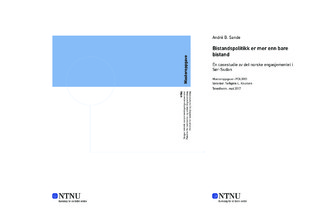| dc.description.abstract | South-Sudan – the youngest state in the world – got its independence in 2011. A referendum concerning their independence was enshrined as a claim in the Comprehensive Peace Agreement (CPA) of 2005. Norway has been a key supporter in South-Sudan´s struggle for independence. Norway has primarily been one of the most important donor countries, donating more than 13 billion NOK. Adding to the donations, Norway has also taken part in the informal ”Troika” formed by USA, Great Britain and Norway. Norway, led by Hilde Frafjord Johnson, was an important part of the peace negotiations between the government in Khartoum and the Sudanese People Liberation Movement (SPLM), which led to the CPA of 2005. Subsequently, looking back at how South-Sudan have become following their independence, it is fair to question why Norway went to such lengths to secure CPA, and that way South-Sudan´s independence. The state of South-Sudan is effectively bankrupt, while the people in charge have robbed the state and society of 850 billion NOK. The elite are living their life in lavish luxury, while half of the country is suffering from famine and are refugees in their own country.
The aim for this thesis is to find answers and the reasoning behind why Norway has had a large engagement in a foreign aid project which has obviously not turned out well. By using neoclassical realism (NCR) as a theoretical framework, it will be featured three levels of analysis; systemic level, domestic level and individual level. This thesis argues that the 9/11 attacks and the war on terror put forward by George W. Bush have been predisposing background factors for the Norwegian engagement in Sudan. Had these pieces not been in place it is not very likely that Norway could, or would, have pursued the engagement in the first place. With the entry of the US, Norway got the possibility of playing an important role in the engagement, which could possibly explain the amount of spending and the importance of the project for Norway. As Norway got to play such an important role, the Norwegian model, the Norwegian self-image and Hilde Frafjord Johnson were all crucial for the Norwegian engagement and the large amount of financial and human resources used. | nb_NO |
